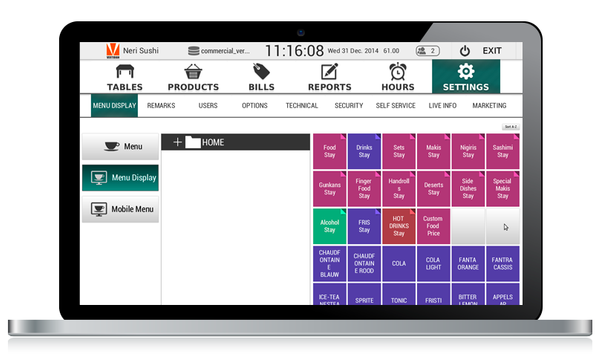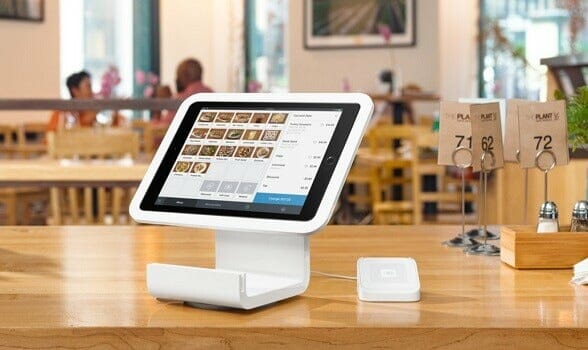Comprehending the Importance of POS Software in Modern Retail Workflow
In today's retail landscape, the function of POS software has actually become significantly significant. These systems have transformed from basic sales register to diverse tools that enhance various facets of operations. They not just simplify purchases however likewise provide insights that can shape company methods. Comprehending just how these systems effect client experience and stock monitoring is vital for any store seeking to remain affordable. The effects of these improvements require more expedition.
The Evolution of POS Software: From Transaction Handling to Comprehensive Solutions

Enhancing Customer Experience Via Advanced POS Features

Improving Inventory Management With Integrated POS Systems
Integrated POS systems play an essential function in streamlining inventory monitoring by automating procedures that generally needed considerable hands-on initiative. These systems enable retailers to track supply degrees in real time, getting rid of inconsistencies that often occur from hand-operated supply matters. With functions such as barcode scanning and automatic stock replenishment notifies, services can keep suitable inventory levels without overstocking or stockouts.Furthermore, integrated POS systems facilitate accurate projecting by assessing historic sales information, allowing merchants to make informed purchasing choices. This anticipating capacity assists organizations adapt to changing customer needs and seasonal trends a lot more effectively.Additionally, the centralization of inventory data throughout several sales channels enhances visibility, enabling merchants to manage their supply more effectively. Inevitably, the assimilation of POS systems into inventory administration simplifies operations, minimizes human error, and adds to increased profitability.
Real-Time Sales Tracking and Coverage for Informed Decision-Making

Precise supply administration prepares for effective sales monitoring and coverage. Real-time sales tracking enables merchants to check sales efficiency as it happens, supplying instant understandings into consumer buying patterns and trends. This capacity enables services to respond swiftly to fluctuations sought after, maximizing supply degrees and minimizing overstock or stockouts.Moreover, integrated POS systems facilitate the generation of detailed reports, highlighting essential metrics such as sales by category, time durations, and private items. Such reporting capabilities equip merchants to make data-driven decisions, recognizing successful approaches and areas requiring improvement.
The Function of POS Software in Client Connection Administration
POS software plays a vital duty in boosting consumer partnership monitoring by enabling merchants to carry out tailored advertising and marketing methods. By evaluating consumer information, organizations can customize promos and interactions to satisfy private preferences. Additionally, these systems assist in the growth of enhanced loyalty programs that urge repeat company and reinforce customer interaction.
Personalized Advertising And Marketing Strategies
As merchants increasingly seek to boost customer loyalty and interaction, personalized marketing approaches have actually emerged as a necessary component of effective consumer connection management. POS software plays an essential function in this process by accumulating and examining client data, allowing merchants to customize advertising and marketing initiatives to individual choices and shopping behaviors. By leveraging understandings from purchase histories, sellers can develop targeted promos and customized interactions that reverberate with customers, fostering a deeper link. In addition, the integration of POS software with client partnership monitoring systems permits smooth monitoring of client interactions, ensuring that advertising and marketing strategies remain pertinent and web link timely (Restaurant POS Software). This data-driven strategy not only improves consumer complete satisfaction but likewise drives sales and urges repeat business, solidifying the store's market position
Boosted Loyalty Programs
Sellers are significantly recognizing the significance of loyalty programs in fostering lasting consumer partnerships and enhancing total interaction. POS software plays a crucial function in the development and monitoring of these programs, enabling sellers to track customer acquisitions, choices, and behaviors efficiently. By leveraging data analytics, services can develop individualized benefits and motivations that resonate with specific clients, thereby increasing involvement in loyalty programs. Furthermore, POS systems enable seamless assimilation with mobile applications and digital platforms, facilitating easy access to rewards and promos. This not only enhances customer complete satisfaction however likewise drives repeat company. Eventually, POS software empowers sellers to cultivate deeper links with their clientele, changing occasional shoppers into faithful patrons with targeted and significant interaction strategies.
Incorporating POS Systems With E-Commerce Operating Systems for Omnichannel Success
To accomplish real omnichannel success, smooth integration between point-of-sale (POS) systems and shopping systems is vital. This assimilation official source allows sellers to unify their stock management, guaranteeing that product schedule is precisely reflected throughout both online and physical shops. Clients benefit from a natural buying experience, where they can conveniently switch between networks without coming across discrepancies.Furthermore, incorporated systems assist in real-time data sharing, making it possible for businesses to evaluate customer behavior and preferences much more efficiently. This data-driven method allows retailers to customize advertising techniques and enhance stock degrees, ultimately improving customer contentment and driving sales.Additionally, the ability to procedure deals throughout platforms simplifies procedures, reducing the danger of errors and boosting overall performance. As stores increasingly adopt omnichannel strategies, the assimilation of POS systems with ecommerce platforms continues to be a critical variable in achieving sustainable development and keeping competitive advantage in the vibrant retail landscape.
Future Trends in POS Innovation and Their Influence On Retail Procedures
As retail operations develop, future patterns in POS technology are readied to reshape the landscape substantially. The increase of cloud-based remedies, developments in mobile POS systems, and the benefits of AI integration are amongst the vital developments anticipated to improve effectiveness and consumer experience. These developments this article promise to enhance procedures and cultivate an extra dynamic retail setting.
Cloud-Based Solutions Surge
With the raising reliance on technology, cloud-based POS services are transforming retail operations by providing enhanced adaptability and scalability. These systems enable sellers to accessibility real-time information from anywhere, facilitating better decision-making and client service. By leveraging cloud infrastructure, organizations can minimize ahead of time costs related to equipment and software installations while making sure smooth updates and maintenance. In addition, cloud-based solutions support multi-location administration, permitting stores to synchronize inventory and sales throughout different electrical outlets effortlessly. This adaptability is necessary in today's fast-paced market, where customer preferences shift rapidly. As more sellers adopt these remedies, they can expect enhanced functional performance and a more responsive approach to market demands, inevitably improving customer contentment and commitment.
Mobile POS Innovations
The evolution of retail technology continues to shape operations, specifically with the rise of mobile POS technologies. These systems enable retailers to refine purchases anywhere within the shop, boosting consumer involvement and enhancing checkout processes. Mobile POS remedies boost stock administration by enabling immediate accessibility to supply degrees, aiding personnel aid customers much more efficiently. On top of that, they facilitate individualized shopping experiences with incorporated customer information and loyalty programs. As smart phones end up being progressively sophisticated, retailers are taking on attributes such as contactless payments and electronic invoices, furthermore optimizing the acquiring journey. The change in the direction of mobile POS not only increases functional performance however also lines up with the expanding consumer choice for ease, making sure that sellers continue to be affordable in a quickly developing market.
AI Assimilation Benefits
AI combination stands for a transformative leap in POS innovation, supplying sellers a myriad of advantages that improve operational effectiveness and customer experience. By leveraging equipment understanding formulas, stores can examine purchasing patterns and optimize inventory monitoring, reducing waste and stockouts. Furthermore, AI-powered analytics provide tailored advertising and marketing recommendations, making it possible for targeted promotions that boost customer interaction and loyalty. Chatbots and virtual aides streamline consumer solution, enabling for quicker resolution of questions and improving the total purchasing experience. Predictive analytics can likewise forecast demand fads, enabling smarter staffing and source allocation. Inevitably, the integration of AI in POS systems encourages merchants to make data-driven choices, cultivating an one-upmanship in an ever-evolving retail landscape.
Often Asked Inquiries
What Are the Costs Connected With Implementing POS Software?
The expenses associated with carrying out POS software can consist of software licensing costs, hardware costs, installment fees, training prices, and recurring maintenance. Each variable adds to the overall investment necessary for an effective execution.
Just How Can Little Retailers Advantage From POS Systems?
Small retailers can gain from POS systems through boosted transaction performance, structured stock monitoring, and boosted consumer understandings. These systems enable much better decision-making, eventually resulting in enhanced sales and consumer fulfillment in competitive markets.
What Hardware Is Needed for a POS System?
A typical POS system calls for essential hardware elements, consisting of a touchscreen screen, cash drawer, barcode scanner, receipt printer, and repayment terminal. These elements collaborate to promote reliable purchase handling and supply management for merchants.

Can POS Software Be Custom-made for Certain Retail Needs?
POS software can undoubtedly be customized to satisfy certain retail needs. Restaurant POS Software. This flexibility allows companies to customize functions, interfaces, and coverage tools, boosting operational effectiveness and offering a much more customized experience for both team and clients
Just How Protected Is Client Information in POS Systems?
The protection of customer data in POS systems differs extensively. Many systems apply file encryption, secure gain access to controls, and normal updates, but vulnerabilities can still exist, demanding recurring caution and aggressive actions from retailers to safeguard sensitive info.